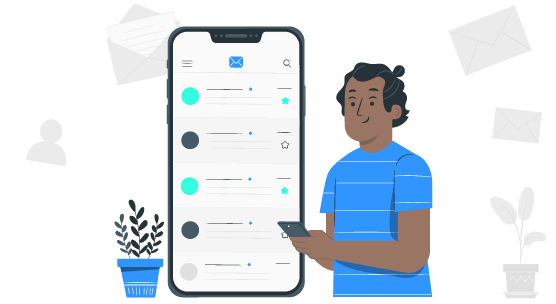A question comes up from time to time in the world of business SMS: is this digital communication tool doomed to disappear?
This is directly linked to the personal use that people have of SMS. It is gradually losing importance to messaging applications and social networks such as Messenger, WhatsApp, SnapChat or Instagram. Younger generations are communicating less and less by SMS and more and more via these mobile messengers.
But the business use is very different. Just as email has not disappeared, business SMS has many uses that cannot be replaced. We decided to take stock of the digital developments that seem to be affecting it and explain why we think SMS has many more years to go!
A few points about professional SMS
- SMS was not intended to become a mass-market tool, but simply a means of communication between operators and their customers. Industry professionals were convinced that consumers would prefer voice calls.
- Business SMS became widespread in the late 2000s and exploded in the 2010s. It is now an essential digital communication tool for many businesses.
- 6.7 billion business SMS messages were sent by companies in France in 2019, an increase of 21% compared with 2018.
Promotional SMS grew by 9.5% in 2019 (compared with 15% in 2018) and transactional SMS grew by 36% (compared with 38% in 2018). - On average, users received 9.6 business SMS messages per month, which is well below the number of emails received (editor's note: 13 promotional emails per day).
- With a carbon footprint of 0.014g of CO2 per SMS sent, it is by its very nature one of the greenest communication tools in existence. By comparison, email, which also requires an internet connection to receive, emits an average of 4g of CO2, and the creation of paper can emit up to several hundred kilos of CO2.
- The CNIL (Commission Nationale de l'Informatique et des Libertés), set up in 1978, is responsible for protecting personal data. Companies have a duty to respect their customers' rights with regard to their data: this applies to the sending of business SMS messages.

The RCS, the evolution of professional SMS
RCS is a new messaging format promoted by the GSMA, an association of nearly 800 mobile phone operators and manufacturers worldwide. This messaging system is largely being pushed by Google, which is providing the Jibe platform to operators to facilitate deployment of the service. It aims to replace text messaging by offering rich, interactive messages to mobile users.

RCS Business Messaging (RBM) is the 'professional' version of RCS and enables companies to send these more comprehensive messages to their customers.
However, an Internet connection is required to receive these messages, which means that it is not suitable for all uses. RCS makes it possible to exchange media (GIFs, videos, photos, etc.), share geolocations, write long texts and create communication scenarios. This makes RBM ideal for creating new, more effective marketing campaigns, but it is not very well suited to sending alerts.
But don't panic! Recipients who do not have this protocol will receive a standard SMS.
RCS has been available in France since summer 2019 and in more than 76 countries worldwide. It is estimated that, with the support of companies such as Google, Samsung and Microsoft, the number of RCS-compatible smartphones should reach 1.4 billion by the end of 2020.
While RCS is an ambitious protocol that aims to evolve the SMS and offer new services that are more in tune with the current uses of mobile users, not all manufacturers and telephone operators are yet ready to launch the RCS protocol on a large scale. For the time being, therefore, the target audience remains relatively small, and it will take a few more years for RCS to become widely available for professional use.
The role of messaging applications
Since the democratisation of smartphones, instant messaging applications have proliferated. Signal, WeChat, Hike and the best-known WhatsApp and Messenger are just some of the applications in use around the world. These messaging services are free and unlimited, which is particularly interesting in some countries where text messaging is still charged for (such as the United States and Japan). There are an ever-increasing number of functions, some of which can now be used to pay bills, make purchases in shops, etc.
In recent years, business versions of some of these applications have been developed, particularly in the area of chat. The two most popular applications with French brands are Messenger and WhatsApp.
Messenger is the most popular for 1:1 contact, thanks in particular to the automatic replies that can be used to create more or less elaborate scenarios.
WhatsApp Business lets you create a company profile and a catalogue of products on offer. Thanks to API integration, companies can also allow their customers to contact their help centers directly from their WhatsApp account.

However, the two companies presented above are American. With the arrival of the RGPD in May 2018, the rights of European citizens with regard to personal data have been strengthened and these companies still have to prove that they comply with these new regulations.
In addition, these messaging systems are more suited to exchanging information and sending notifications than to mass communication.
The need for secured communication

Due to increased cyber threats and insecurity these last few years, protectiong yours and your customer's data is essential !
On one hand, your business and its infrastructures needs to be protected ! Breaches could result in denial of service attacks and freeze your business. This can create high revenue losses and destroy your company's reputation.
To avoid this type of situation, here are a few things you can set up :
- Install firewalls
- Perform regular penetration tests to patch any breaches
- Train your team so they can identify threats and react
- Keep yourself updated ! New hacking techniques see the light of day often.
On the other hand, your client's data is at stake ! As soon as you deal with personal data, any cyber issue needs to be avoided. Your customers trust you with their information. Make sure you follow these steps when organizing your SMS communication efforts :
- Make sure the people you are contacting via SMS opted in to your marketing messages.
- Apply GDPR regulations if you are communicating in Europe.
- Encrypt your communications to reduce the risk of data breaches by using a secure VPN.
Automation for tailored communication
Trying to create more effective communication strategies is the pain point of any marketer. And making sure the pieces of information are relevant to the target market is even harder. Once your target’s needs are identified, finding the right moment and the right content to communicate is much easier! And can be automated with Marketing Automation in a few key steps:
- Identify the needs of each of your personas,
- Study your leads' typical journey and interaction with your content,
- List your entry points,
- Define the path to automate,
- And communicate!

This process is usually set up via a CRM Software allowing you to communicate with your leads and clients using different communication channels. For example, one in which you can use various ones, including professional SMS is Firmao! Using the SMSFactor x Firmao integration via Zapier will allow you to diversify your communication efforts by sending automated SMS notifications, promotional SMS messages, and more!
In short, professional SMS messaging can help you convert interested leads with the content they need at the time they need it. But also increase customer retention thanks to automated client follow-up!
Over the last few decades, consumer habits have evolved. The emergence of new digital communication tools is diversifying practices. Posters, social networks, e-mail, business text messages... Communication media and methods are not disappearing, they are evolving and adapting, enabling businesses to communicate more effectively with their consumers, wherever they are and whenever they want.